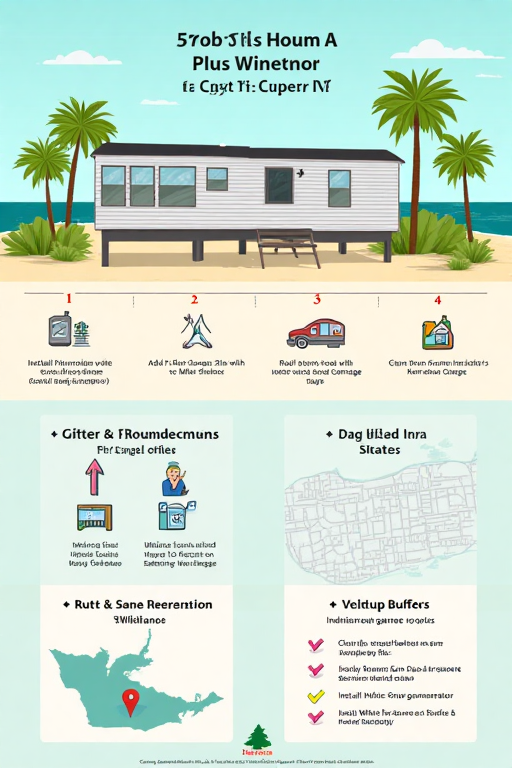Is It Possible to Trade-In Your Mobile Home in South Carolina?
Your Comprehensive Guide from Faith Mobile Home Solutions
Introduction
Trading in your mobile home is an innovative option for South Carolina homeowners who want to upgrade or change their living situation without the hassle of a traditional sale. With the evolving real estate market, trade-ins have emerged as a creative solution that can help you streamline the process and potentially secure a favorable deal.
This comprehensive guide from Faith Mobile Home Solutions explores everything you need to know about trading in a mobile home in South Carolina. Spanning over 7,000 words, we delve deep into the trade-in basics, discuss the benefits and drawbacks, outline the step-by-step process, and provide expert advice on negotiation, financing, and legal considerations.
Whether you’re considering trading up to a newer model or simply looking for an easier way to transition from your current home, our detailed guide is designed to equip you with the knowledge and strategies needed to make an informed decision. Read on to discover how you can transform your mobile home trade-in experience into a successful investment.
Trade-In Basics: Understanding the Concept
A mobile home trade-in involves exchanging your current mobile home for a credit toward the purchase of another. This arrangement can be particularly beneficial if you want to avoid the lengthy process of selling your home on the open market or if you desire a seamless transition to a new property.
What Is a Trade-In?
A trade-in is an arrangement where you offer your current mobile home to a dealer or a third party as part of the down payment or purchase price for a new mobile home. It is similar to trading in a car, where the dealer adjusts the purchase price based on the value of your existing property.
How Trade-Ins Work
The trade-in process typically involves an appraisal of your current mobile home to determine its market value. This value is then deducted from the price of the new mobile home you wish to purchase. The trade-in value depends on various factors such as age, condition, location, and upgrades.
Who Offers Trade-In Programs?
Many mobile home dealers and manufacturers in South Carolina offer trade-in programs as part of their sales strategy. These programs are designed to encourage upgrades and simplify the buying process for customers.
Understanding the basics of trade-ins is key to evaluating whether this option aligns with your financial and lifestyle goals.
Benefits & Drawbacks of Trading In Your Mobile Home
Like any real estate transaction, trading in your mobile home comes with its advantages and potential downsides. Knowing both sides of the equation will help you decide if a trade-in is the right option for you.
Benefits
- Simplified Process: Trading in can be quicker and less stressful than selling your mobile home independently.
- Upfront Credit: The trade-in value acts as a credit toward your new purchase, lowering your overall out-of-pocket expense.
- Convenience: Dealerships often handle much of the paperwork and logistics, making the process more seamless.
- Potential Tax Benefits: Certain trade-in transactions may offer tax advantages, depending on local regulations and financing arrangements.
Drawbacks
- Lower Offer: Trade-in offers may be lower than what you could achieve on the open market if you sell your home independently.
- Limited Options: Not all dealers or lenders offer trade-in programs, which can limit your choices.
- Potential Fees: Some programs include fees that may affect the net credit you receive.
- Negotiation Complexity: Combining trade-in value with the purchase price of a new mobile home may require skilled negotiation to achieve a fair deal.
Weighing these benefits and drawbacks will help you decide whether a trade-in is the best route for your situation.
The Trade-In Process: Step-by-Step Guide
Once you’ve decided that trading in your mobile home is the right option, understanding the process is critical. Here is a detailed, step-by-step guide to help you navigate the trade-in process in South Carolina.
Step 1: Research and Identify Dealers
Start by researching dealers and manufacturers who offer trade-in programs. Look for reputable companies with good customer reviews and competitive trade-in offers.
Step 2: Request an Appraisal
The dealer will appraise your mobile home to determine its current market value. Make sure to prepare your home by addressing minor repairs and improvements that could increase its value.
Step 3: Review Trade-In Offer
Once the appraisal is complete, review the trade-in offer provided by the dealer. Compare this offer with independent market valuations to ensure it is competitive.
Step 4: Negotiate the Trade-In Value
Don’t be afraid to negotiate. Use your research and any documented repairs or upgrades as leverage to secure a higher trade-in value.
Step 5: Apply the Trade-In Credit
If you accept the trade-in offer, the dealer will apply the credit toward the purchase of your new mobile home. Review all terms carefully to ensure transparency.
Step 6: Complete the Transaction
Finalize all paperwork, secure financing for any remaining balance, and complete the transaction. The dealer will handle most of the administrative tasks, making it a streamlined process.
This step-by-step process ensures that you maximize your trade-in value and transition smoothly to your new mobile home purchase.
Financing Options & Considerations
Financing is a critical component of any mobile home purchase. When trading in your mobile home, the trade-in value reduces your down payment, but you must still secure financing for the remainder of the purchase price. Understanding your financing options will help you make a more informed decision.
Traditional Bank Loans
Banks and credit unions offer loans specifically designed for mobile home purchases. These loans typically have strict credit requirements but may offer competitive interest rates if you have a strong financial profile.
Specialized Mobile Home Lenders
Some lenders specialize in mobile home financing and offer more flexible terms and lower down payment requirements. These institutions understand the unique dynamics of the mobile home market.
Dealer Financing Programs
Many dealers offer in-house financing options that can be combined with your trade-in credit. This option may simplify the process, although it is important to compare rates and terms with other financing sources.
Government-Backed Programs
Explore government programs and incentives, such as FHA loans, which may be available for mobile home purchases. These programs can offer favorable interest rates and more accessible qualifying criteria.
Carefully evaluate these financing options to ensure that your overall investment remains sound and that you secure the most advantageous terms possible.
Legal Considerations & Documentation
Legal considerations are essential when trading in your mobile home. Ensure that all trade-in arrangements and financing agreements are documented clearly to protect your interests and comply with South Carolina regulations.
Reviewing Contracts and Disclosures
Thoroughly review all contracts and disclosures provided by the dealer. Pay attention to any fees, contingencies, and conditions that may affect your trade-in value or the terms of your new purchase.
Title and Ownership Issues
Make sure that your mobile home’s title is clear and that there are no outstanding liens or encumbrances. A clear title is crucial for a smooth trade-in and future financing.
Consulting a Real Estate Attorney
If you are unsure about any aspect of the trade-in process or legal documentation, consult with a real estate attorney who specializes in mobile home transactions. Their expertise will help protect your rights throughout the process.
Proper legal documentation and due diligence are key to ensuring that your trade-in transaction is fair, transparent, and legally sound.
Market Conditions & Negotiation: Timing Your Trade-In
Market conditions significantly impact the negotiation process. Understanding current trends in the South Carolina mobile home market will help you time your trade-in for maximum benefit.
Analyzing Local Market Trends
Stay informed about local real estate trends, including supply, demand, and price fluctuations. A seller’s market may provide less negotiating room, while a buyer-friendly market could give you additional leverage.
Using a Comparative Market Analysis (CMA)
A CMA provides a detailed look at recent sales of similar mobile homes in your area. Use this data to benchmark your trade-in offer and negotiate effectively with the dealer.
Negotiation Timing
Consider seasonal trends and economic cycles that affect property values. For instance, the off-season may offer a better opportunity to negotiate a higher trade-in value than during peak market periods.
A keen understanding of market conditions enables you to approach negotiations with confidence and secure the best possible trade-in value.
Negotiation Strategies: Securing the Best Trade-In Value
Effective negotiation is the cornerstone of a successful trade-in. By leveraging the information you’ve gathered and utilizing proven negotiation techniques, you can maximize the value of your trade-in and reduce the cost of your new mobile home.
Start with a Competitive Offer
Begin by presenting a well-researched offer that reflects the current market value of your mobile home, taking into account any necessary repairs or upgrades.
Leverage Repair & Upgrade Data
Use evidence from inspections, repair estimates, and recent upgrades to support your offer. Highlighting areas where you’ve invested in the property can justify a higher trade-in value.
Be Ready to Compromise
Negotiations often involve give-and-take. Be prepared to make concessions in areas that are less critical while standing firm on key points that affect your overall budget and goals.
Maintain Professionalism
Keep the negotiation process respectful and professional. A calm and factual approach, supported by data, is more likely to yield positive results than one driven by emotion.
Follow Up Consistently
If negotiations stall, follow up with additional data or a revised offer. Persistence can often lead to breakthroughs in the negotiation process.
By using these negotiation strategies, you can secure a trade-in deal that aligns with your financial goals and makes your mobile home purchase more affordable.
Expert Tips from Faith Mobile Home Solutions
Our team has years of experience helping buyers secure favorable deals in the South Carolina mobile home market. Here are our top expert tips to help you negotiate the best price during your trade-in:
Do Your Homework
Thorough research is the foundation of any successful negotiation. Be sure to gather detailed data on comparable sales, market trends, and the condition of your mobile home.
Document Every Detail
Keep records of all communications, inspections, repair estimates, and upgrades. Documentation will support your negotiation and help justify your asking price.
Set Clear Objectives
Before entering negotiations, establish your target price, ideal trade-in value, and acceptable concessions. Knowing what you want to achieve will help keep the discussions focused.
Be Willing to Walk Away
If the dealer’s offer does not meet your expectations, be prepared to walk away. Sometimes, showing that you have other options can encourage the seller to negotiate more seriously.
Seek Professional Guidance
Engage with a knowledgeable real estate agent or attorney experienced in mobile home transactions. Their insights can strengthen your negotiation position and help you navigate complex deal structures.
Stay Patient and Persistent
Negotiations may take time. Stay patient, follow up regularly, and be flexible in your approach while maintaining your key objectives.
Implementing these tips will give you a competitive edge in negotiations and help you secure the best possible deal on your mobile home trade-in.
Conclusion: Negotiate Smart and Maximize Your Trade-In Value
Negotiating the best price when trading in your mobile home in South Carolina is both an art and a science. With thorough market research, careful preparation, and the right negotiation strategies, you can secure a favorable trade-in deal that significantly reduces the cost of your new mobile home purchase.
We have explored every facet of the negotiation process—from understanding the market and preparing your property to employing effective communication and overcoming obstacles. Armed with these insights and expert tips, you are well-equipped to make an informed decision and maximize your investment.
Thank you for choosing Faith Mobile Home Solutions as your trusted resource. We wish you success in your mobile home trade-in journey and a prosperous future built on smart, strategic negotiations.
Frequently Asked Questions (FAQs)
1. What is a mobile home trade-in?
A mobile home trade-in is when you exchange your current mobile home for a credit toward the purchase of a new one, similar to trading in a car.
2. How do I determine the trade-in value of my mobile home?
The trade-in value is typically determined by a professional appraisal, which takes into account the home’s condition, age, location, and market comparables.
3. Can I negotiate the trade-in value?
Yes, you can negotiate based on repair needs, upgrades, and market data. Documentation of repairs and upgrades can help justify a higher value.
4. What financing options are available for mobile home trade-ins?
Financing options include traditional bank loans, specialized mobile home lenders, and dealer financing programs, as well as government-backed programs like FHA loans.
5. Does a trade-in affect my down payment?
Yes, the trade-in value is applied as a credit towards the down payment on your new mobile home, reducing the amount you need to pay upfront.
6. How important is market research in a trade-in negotiation?
Market research is critical; it provides data on comparable sales and current market conditions, which strengthens your negotiation position.
7. What are the benefits of trading in my mobile home?
Benefits include a simplified sales process, immediate credit toward your new purchase, reduced paperwork, and potentially lower overall costs.
8. Are trade-in programs available at all mobile home dealerships?
No, trade-in programs vary by dealer. It is important to research local dealers and compare their trade-in offers.
9. How do seasonal market trends affect trade-in values?
Seasonal trends can impact demand and pricing; buying during off-peak seasons might give you leverage to negotiate a higher trade-in value.
10. What documentation should I prepare for a trade-in appraisal?
Prepare records of any repairs, upgrades, maintenance history, and original purchase documents to support your trade-in value.
11. Can I trade in a mobile home that is not on my land?
Typically, trade-in programs require that you own the mobile home. However, specific requirements vary by dealer.
12. What is the role of a Comparative Market Analysis (CMA) in trade-in negotiations?
A CMA provides data on recent sales of similar mobile homes, which can be used to benchmark your trade-in value and negotiate a fair deal.
13. How do repair estimates influence my trade-in value?
Repair estimates highlight necessary improvements that can reduce your home’s value. Presenting these estimates during negotiations can help you secure a better trade-in credit.
14. What should I do if the dealer’s trade-in offer is too low?
Negotiate with the dealer by providing evidence from your appraisal and repair estimates, and be prepared to explore alternative offers.
15. Can I trade in my mobile home if it requires significant repairs?
Yes, but the trade-in value will likely be adjusted based on the estimated repair costs. Negotiating for repair credits or discounts can improve the deal.
16. Are there fees associated with mobile home trade-in programs?
Some dealers may charge fees for processing a trade-in. Make sure to understand all potential costs before proceeding.
17. How does a trade-in impact my financing options?
Using a trade-in as a down payment credit can reduce your financing burden, often resulting in lower monthly payments and improved loan terms.
18. Do I need to negotiate separately for the trade-in and new purchase?
Both elements can be negotiated together, but it’s important to separate the two to ensure that you are getting a fair deal on each.
19. How can I verify that I’m getting a fair trade-in value?
Obtain independent appraisals and conduct a Comparative Market Analysis (CMA) to benchmark the dealer’s offer.
20. What should I consider when reviewing a trade-in contract?
Ensure all negotiated terms are clearly documented, including the trade-in value, any fees, contingencies, and how the credit is applied to the new purchase.
21. Can I use a trade-in if I’m planning to relocate?
Yes, trade-in programs can be beneficial if you want to upgrade your mobile home before moving, although you should verify the specific requirements of the dealer.
22. Are trade-in values fixed or negotiable?
Trade-in values are typically negotiable. Use market data, appraisal reports, and repair estimates to support your negotiation for a higher value.
23. What role does timing play in a mobile home trade-in?
Market timing is important. Negotiating during a buyer-friendly or off-peak market can give you additional leverage in securing a better trade-in offer.
24. How do I know if a dealer’s trade-in program is reputable?
Research the dealer’s reviews, ask for referrals, and compare trade-in offers from multiple dealers to ensure you are dealing with a reputable company.
25. Where can I find more resources on mobile home trade-in programs?
For more information, consult Faith Mobile Home Solutions, local mobile home dealers, and online real estate forums specializing in mobile home transactions.
Additional Keywords
- mobile home trade-in
- trade-in mobile home
- South Carolina trade-in
- mobile home exchange
- trade-up mobile home
- Faith Mobile Home Solutions
- mobile home appraisal
- mobile home financing
- used mobile home trade
- mobile home dealer trade-in
- resale mobile home value
- mobile home market trends
- trade-in negotiation
- repair credit mobile home
- trade-in process
- mobile home trade-in tips
- equity trade mobile home
- mobile home price reduction
- trade-in discount
- mobile home transaction
- mobile home buyer incentives
- mobile home trade-in program
- mobile home trade-in guide
- mobile home trade value
- trade-in options mobile home




